Much as I do not like like Dev Anand in his post-60’s avatar (the too-black hair, the bandanna and the cap don’t make him look any younger; they just bash home the fact that he’s aging most disgracefully)—I do like him in a lot of the films he did in the 50’s and early 60’s. There are some great suspense films here (CID, Baat ek Raat ki, Kaala Paani, Jewel Thief) and some great drama/thriller/romance/whatever (Jaal, Hum Dono, Paying Guest, Solvaan Saal, Guide, the very unusual Ferry)—and this, a simple story of a thief who finds himself impersonating the long-lost son of a village zamindar.
Babu (Dev Anand) has just emerged from jail after serving four months for robbery. He gets a warm welcome from old buddy and fellow crook Balli (Jagdish Raj, Hindi cinema’s most frequent player of policeman roles, here playing on the other side of the law). Balli takes Babu to their old hideout, where he briefs Babu about an upcoming bank heist: Babu will have to play a wealthy man and win the bank’s trust.
To help Babu play the role, Balli hands him the keys to a car that will be his for the duration of the job. Attached to the key ring is a ring that Babu finds intriguing. When he asks Balli whose ring it is, Balli becomes depressed and tells Babu that it is his, Balli’s, ring, his only keepsake from 20 years ago. It turns out that when Balli was 5 years old, he got separated from his parents; he has no idea where they live or who they are. The ring is his only connection to them.
Emerging from the hideout, Babu runs into another old friend: a police inspector called Shyam (Manohar Deepak), who’s been tailing Babu since he got out of jail. Babu and Shyam go back a long time. As Shyam tells a havildar, they were very close friends in school. One day, as a prank, they stole something and were caught. Shyam’s rich father managed to get him freed; but Babu, because he was poor, ended up branded a thief for life. Now Shyam tries to persuade Babu to give up his lawlessness, but Babu’s too bitter and cynical to listen.
Shyam’s pleas eventually do have an effect, and when Babu next meets Balli, he announces that he’s getting out. He’s sick of this life, and wants to go straight.
Balli and the other members of the gang are suspicious; and Balli’s suspicions change to certainty when, shortly after, the police nab the entire gang. Balli is convinced Babu squealed. So, since he’s been released on bail, Balli goes after Babu and confronts him.
Babu tries desperately to get Balli to let go of him, but to no avail. There’s a tussle, Babu hits out at Balli—and Balli dies of concussion, right there at Babu’s feet.
Babu does what comes first to his mind: he flees. From Bombay, past Jhansi, Agra, Delhi, Pathankot… to Jogindernagar, where he finally gets off the train and looks about for some refuge. At Jogindernagar, he meets the huqqa-gurgling, shrewd-eyed Bhagat (Rashid Khan), who offers to share his food with Babu.
Babu, willy-nilly, (Bhagat isn’t an especially endearing character) falls in with Bhagat, drinking tea with him and trying to while away his time. Bhagat, in his turn, soon realises that Babu goes out of his way to avoid policemen. It’s obvious to one as watchful as Bhagat that Babu has a past that the police may well want to know more about—and which Babu may want to hide.
In the night, Bhagat takes Babu onto the hillside and points out a village on the opposite hill—or, more specifically, points out a certain house in the village. That house, he says, is the home of the wealthiest zamindar in the village, a man whose only son, Kundan, was lost 20 years ago when he was 5 years old. The family has been pining for its lost scion ever since. If Babu were to present himself as Kundan, he would be welcomed with open arms (and an equally open safe, full of money and jewellery).
Babu, though he’d made such a hoo-ha about leaving a life of crime etc, is not averse to the idea. Bhagat says he knows the family inside out, and will be able to tutor Babu in all that a child of 5 would have known about his parents, his home and his family.
So, a few days later, a letter written by ‘Kundan’ arrives at the home of Kundan’s father, Shahji (Nasir Hussain). Shahji’s munim, whom everybody addresses as Mamaji (Dhumal), Shahji, and Shahji’s blind wife Rukmini (Achla Sachdev) are beside themselves with joy. That Kundan, darling, long-lost Kundan, should finally be coming home!
And when Babu arrives, the joy on the part of the parents is almost overwhelming. So much, in fact, that Kundan finds himself touched by the love of Rukmini, who embraces him and wishes she could have her eyesight back for just long enough to be able to feast her eyes on him.
The next family member whom Babu must contend with is Kundan’s sister Maya (Suchitra Sen). She’s curious about his past, and he gives her a cock-and-bull story about a mendicant who’d taken care of him for a few years, making him a beggar before he, Kundan, ran away. Babu manages to satisfy Maya’s curiosity for the time being, but she disturbs him: she’s just too breathtakingly beautiful for him to be able to reconcile to the notion that she’s supposed to be his sister. This is where, as the days pass, problems begin to arise. Kundan cannot think of Maya as a sister; he subtly tries to show her that he admires her beauty and that he has deep feelings for her—and Maya, of course, is not quite sure whether she’s imagining things, or whether this strange brother of hers really isn’t a brother after all.
So the story goes on, with Maya becoming increasingly uncomfortable, suspicious (and perhaps attracted?)… and Bhagat, who turns up like the proverbial bad penny, putting pressure on Babu to hurry up and empty Shahji’s safe. But the Babu who had agreed to Bhagat’s plan isn’t the Shahji who has been fed jalebis by a doting mother who remembers every bit of her son’s brief childhood. He is, even against his will, becoming a part of this family, enough to speak up against Shahji when he arranges Maya’s wedding, and enough to tell Bhagat to his face that he loves Maya.
And far away, in Bombay, Inspector Shyam receives news that Babu had been spotted at Delhi Railway Station.
How will it all work out? Will Babu’s unsavoury past catch up with him? What if the real Kundan turns up? And even if he doesn’t—will Shahji, Rukmini and Maya be ready to accept Babu instead of Kundan?
Do watch if you can get hold of this one. It does have all the usual elements of the 50’s and 60’s crime-social dramas, but it’s skilfully made, well constructed and sensitive.
What I liked about this film:
A lot. As I mentioned, it’s very well made. The story is simple and isn’t replete with twists and turns; instead, it focuses on character development. The growing relationship between Babu and Maya, for example, is well paced: there’s none of the sudden revelation of love that so many films fall prey to. Babu sees Maya and is attracted to her, but they grow closer only as time goes by, and it happens only gradually that she realises his feelings towards her are romantic, not brotherly. And throughout the film, there’s a lot that’s left unsaid, especially between Maya and Babu.
The music, by S D Burman. My favourites are Dekhne mein bhola hai and Deewana mastaana hua dil, but there are others too that are lovely: Chal ri sajni ab kya soche and Saathi na koi manzil, for example.
The direction, the cinematography, the angles, the frames: fabulous! Raj Khosla (one of my favourite directors) is especially brilliant here. Well done, Mr Khosla; very well done.
Suchitra Sen. Ah, so, so beautiful. Even if for nothing else, you should watch Bombai ka Babu to see her; she’s exquisite.
What I didn’t like:
Nothing very much that I can think of, really. Except that in the scene where Bhagat first persuades Babu to act as Kundan, it seems as if Babu agrees because he wants to do this job, not because Bhagat is threatening to inform the police of Babu’s whereabouts if Babu doesn’t co-operate.
But then, that may have been the whole point of the thing. It doesn’t quite make sense, unfortunately, because just a couple of scenes before this, Babu had been vowing never to turn to crime again.

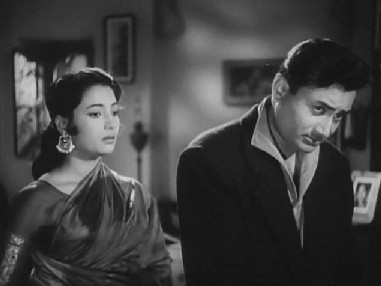
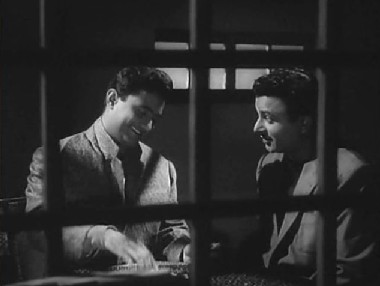
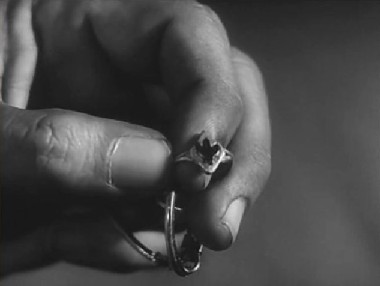

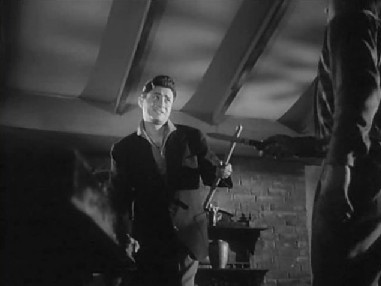
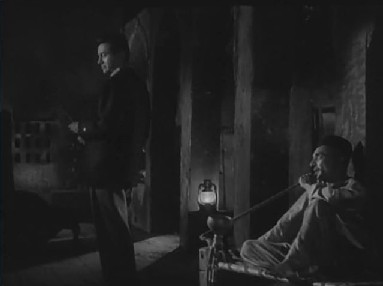
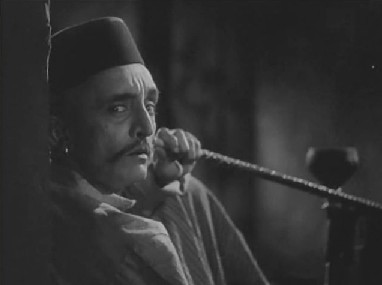
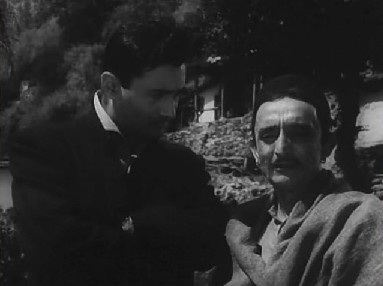
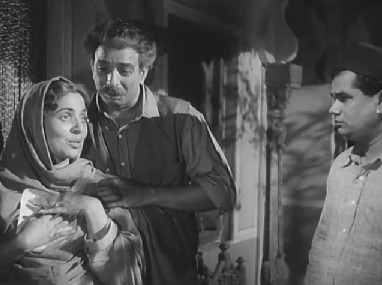
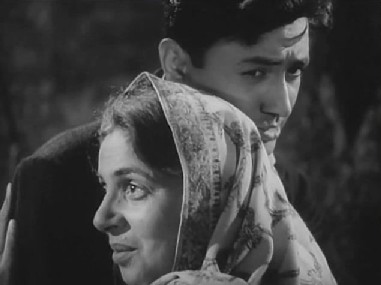
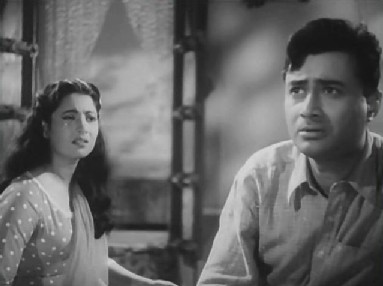

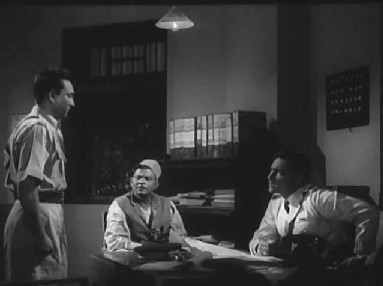
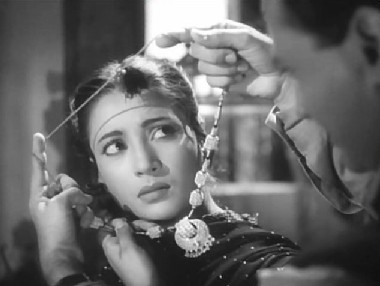
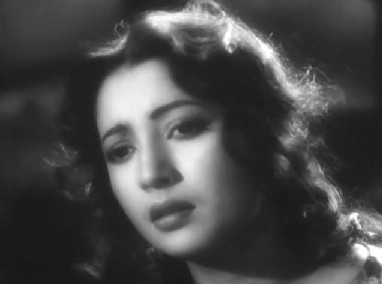
Bombai ka Babu sounds like a good watch, does it mean Babu of Bombay? I love Dev and have been into him a lot lately, i tend to like his 50’s – 60’s stuff a lot more than his 70’s stuff,Hare Rama Hare Krishna irrespective of the fabmusic is one of the most ANNOYING films i’ve ever watched. I still haven’t seen much from Raj khosla, his two films that i’ve seen Do Badan & Main Tulsi Tere Angan Ki didn’t impress me much either
LikeLike
A big YES to everything you say – this is such a perfect little gem of a movie. Even Dev Anand rises to some histrionic greatness. :-) My favorite part is the end – its such a fitting conclusion. I’ve often wondered if this was a remake of some Hollywood film (so many of my favorite Indian films were!), and if so which one? If it isnt, its certainly a genius of a mish-mash of several different stories – O. Henry’s A Double-dyed Deciever with shades of his A Retrieved Reformation and generous helpings of Josephine Tey’s Brat Farrar. (In Brat Farrar the imposter even falls for his “sister”, like Babu does!)
bollywooddeewaana Khosla’s best films were in the 50s and 60s – CID, Solva Saal, Kaala Paani, this one, and Ek Musafir Ek Haseena are all superb. Try some of them!
LikeLike
Brat farrar was a 1986 TV serial, as per IMDB, while this film was released in 1960..Or am I missing something..
O Henry’s story sure has distinct resemblance to this one…
LikeLike
I don’t know when bollyviewer will get around to seeing your comment, storyies4kidsNagesh – I think she’s rather busy these days and isn’t visiting this blog, but if you have a look at the link she’s provided for Brat Farrar, you’ll see that it’s also a book from 1949. So maybe Bombai ka Babu borrowed from the book rather than from (as you rightly point out) the TV series.
LikeLike
black and white movies of dev saheb are absolute joy. kala pani, solvah saal, kala bazaar, munim ji, paying guest etc. i didn’t like tere ghar k saamney except dil ka bhawar karey pukaar.
LikeLike
I watched some of this film when I found it on YouTube with English subs a little while back. I can’t find it now, but I’m not sure if it had been listed by its real or full title – it might have been disguised to dodge the copyright police.
I stopped watching shortly after Babu arrived at the family’s place. I had just seen a couple of these Hindi movies in which someone assumes someone else’s identity and I was growing tired of that theme and the particular kind of suspense that goes with it. I wouldn’t mind seeing the rest of it, though; I might be in a better mood the next time around.
As I mentioned on Memsaab’s blog, in recent months, I watched a couple of Dev Anand films from the late ’40s. Where Dev is concerned, I tend to think, the earlier, the better. :)
LikeLike
P.S. Correction – in recent months, I saw one Dev film from the late ’40s (’49), another from 1950. I guess I count everything before his Baazi breakthrough as being his “40s films. :)
LikeLike
>I tend to think, the earlier, the better. :)
Hehehehe!!! :-D
I’m really intrigued and want to know how it ends. This means I’ll have to add it to my list. :-)
I love the songs especially a ‘bidai’ sounding song.
LikeLike
Since I read about it in Upperstall I’d always meant to find this film, but never could!
Your well-written review, makes me crave for it more.
Suchitra Sen was a real beauty.
And Dev… *sigh*
Surprisingly, although the songs were quite often to be seen in Chayya Geet on DD, they never aired the movie.
Maybe because of the incestous slant of the story.
Thanks for bringing it to notice.
LikeLike
I have picked this up a number of times the past couple of weeks and then put it down again in favor of something else…guess this will bump it up! :)
LikeLike
I have LOVED this film ever since I first saw it on DD ages and ages ago…loved the songs, loved the unusual storyline, the real pain the characters went through…and Suchitra Sen was just fantastic: I don’t think i have ever seen her look as lovely again, although her acting has always been there with the best.
Also, because the story took believable -within its plot- developments, and there was never any fiddling about to deal with situations.
Chal ri sajni must be one of the most emotional scenes in Hindi cinema, ¿has Mukesh ever been more suited to a song? and the Suchitra Sen song based on traditional punjabi song, one of the most joyous ever.
LikeLike
I love “Bombai Ka Babu” as well and think it’s pretty brave of Dev Anand to have made this movie. Affected mannerisms, swaying gait and pompadour hair aside, I have to admit that DA’s movies always had very interesting, unusual plots.
LikeLike
Suchitra looks gorgeous in this movie. Unfortunately, I haven’t seen the entire movie yet. I have seen it only till Dekhne mein bhola . It was pretty unusual and intriguing but I don’t remember why I couldn’t see the whole thing. Had seen it few years ago, when Sony and Set Max used to air old movies in prime time.
I prefer Dev Anand in black and white movies more than his later ones. I guess Zameer, starring Shammi, Saira, Amitabh and Vinod Khanna was a remake of this.
LikeLike
bollywooddeewana: I’m with bollyviewer on the Raj Khosla recommendations – the ones she’s mentioned are among his best! Another of my favourites is Mera Saaya. ‘Bombai ka Babu’, btw, can mean either the ‘gentleman of Bombay’ (babu is a term used much like ‘mister’), or a nudge towards his name – Babu of Bombay (since the character’s name was Babu).
bollyviewer: Good heavens, I hadn’t thought of relating this to O. Henry’s stories, but you’re so right! There are shades of those tales in this… and I’m off to look for Brat Farrar now!
Richard: I agree with the ‘earlier is better’ rule for Dev Anand – though I have to admit I don’t much care for Vidya, the earliest Dev Anand film I’ve seen. Do watch Bombai ka Babu, though: it’s not the usual cliched Hindi film. And just so well made.
pacifist: And I’m not going to tell you how it ends; watch for yourself! ;-)
memsaab: Yes, I’d recommend bumping it up. This is one of my favourite Dev Anand films, not the fluff of Paying Guest or Solvaan Saal, but more profound and beautiful.
bawa: Isn’t Chal ri sajni fabulous? I am not a Mukesh fan, but this is one where I really like him – there’s so much emotion in his voice.
Shalini: I do think his mannerisms are a little subdued in this one, though… and I’m with you on his films. They’re generally very watchable!
sunheriyaadein: As I mentioned to Shalini, I think Dev Anand’s films are just so watchable! Some of my favourite films- CID, Paying Guest, Nau do Gyarah, Tere Ghar ke Saamne, Bombai ka Babu, Jewel Thief… all star him. Along with Shammi Kapoor and perhaps Dharmendra, one of those Hindi actors for whom I’d watch a film just because it starred him. But yes, Dev Anand almost exclusively only in B/W films!
LikeLike
@ bollyviewer: Have to read more of O’ Henry again. He somehow moved out of reading ‘repertoire’ some twenty years ago. Thanks for the hint.
@ dustedoff & sunheriyaadein: I wouldn’t say Dev only in BW, then you will have to forego his Guide, Jewel Thief, and Johny Mera Naam which were good, splendid movies.
@ bawa & dustedoff: Chal ri sajni is indeed a very bautiful song. I’m also not a real Mukesh fan. But his songs for SD and RD are his (according to my opinion) his best. His “O jaanewale ho sake to laut ke aana” make sme cry everytime I hear it. “Kahin karti hogi” with Panchamda is also a gem!
@ Richard S: Thanks for the tip. Will have to look it up.
Didn’t babu also mean an office worker?
LikeLike
Yes, you’re right – babu also means an office worker (a clerk), but as far as I think, it’s usually used in a somewhat derogatory way. Didn’t think of that connotation for babu because the Dev Anand character in this film doesn’t have anything to do with that.
And another Mukesh song which I really love (despite the fact that it’s picturised on Raj Kapoor!) is Woh subah kabhi toh aayegi – it’s utterly wonderful, so much depth and feeling.
LikeLike
I could just watch the first ten minutes of the film on youtube. It made me wish for more.
The opening scene: two freinds waiting for Dev, who is coming out from jail. One is a policeman, the other a thief. He chooses the thief. They are then followed by the police jeep and we can see them through the windscreen as the credits roll on, giving it a cinemascope feeling. I think this also sets the pace of the movie. Dev being chased by the police. And sitting behind the windscreen we, the viewers, are also voyeurs. Or maybe even partners in the chase/persecution?
They enter the thieves den. Then there is this funny scene, where Jagdishraj and Dev are shown sitting through screen bars and Jagdish tells Dev that he looks ‘sharif’ and not like the others, who look like ‘chor-uchake’. Something like the case of sitting in a glass house and throwing stones at others!?!
As he comes out and meets his old friend, who is now a police inspector asking him to turn over a new leaf, the song being played in the background is:
dil jale to jale, Gam pale to pale
kisii kii na sun gaaye jaa
Asking him to go his own way and not listen to others!
Fascinating!
LikeLike
You are right, the word I was searching for is Clerk and naturally it doesn’t have any connection with the film.
For non-Indians: In India, the bureaucracy is also called babudom.
Wow, the song “woh subah kabhi to aayegi” is great. I just love it. There is an Asha version as well, which I, at times, prefer above Mukesh’s.
Or is it a duett?
LikeLike
Yes, isn’t the start fascinating? And I’d go so far as to say that those beautifully subtle indications and pointers continue throughout the film. I need to watch this one more time, I think. Incidentally (and I have no idea if this was deliberate), the film Naya Daur had a song picturised on Johnny Walker which went Main Bambai ka babu naam mera anjaana (“I’m a babu from Bombay, my name is unknown”) – in 1957. Coincidence?
And yes again: Woh subah kabhi toh aayegi is a duet. It’s one of the most haunting songs I’ve ever heard. Absolutely unforgettable.
LikeLike
I think babu meant a trouser, shirt, tie wearing man who belonged to a city Bombai being a fast industrialising modern city then, it became a cliché that a Babu must be from Bombai.
IIRC there are many old films where such a person was referred to as a Babu (as in Madhumati).
LikeLike
Yup. There were loads of films back then featuring a city slicker who fell in love with a village girl who called him babu. (Which is a theme I find hard to swallow; how common is it for someone to fall so completely in love with someone with whom they share just about nothing in common?)
LikeLike
pacifist, it is NOT associated with Bombay at all!
Meant a white-collar worker, a clerk, etc. as has been pointed out earlier. In places like Punjab, it is also to denote a clean-shaven person compared to a Sardarji.
Although, my own great-grandfather was called bauji = punjabi pron of babuji, and he was a turbaned Sikh with a flowing beard! But as he had been a draughtsman for british railways in various parts of the empires, upon his retiring to a village in the Punjab, he was forever bauji.
LikeLike
bawa, I’ve heard the word bauji often enough, but had no idea it was the Punjabi equivalent of babuji. Thank you for that bit of information! (and also that babu could mean a clean-shaven person as opposed to a sardarji)… didn’t know that either.
LikeLike
dustedoff, you know how they “eat” all those fancy hindi sounds in punjabi.
see that in Pb offices for instance: peon will go and get the “bauji” or the “sardarji” in question.
LikeLike
Yes! Now that you mention it, of course… my husband is a Punjabi only in name but his parents, and to an even greater extent his uncles and aunts, are very deeply rooted in Punjab. And now that I think of it, that’s exactly how they “eat up” all those fancy Hindi sounds!
LikeLike
Yes, this indeed is one of my all time favourites. Specially the fatal attraction of Babu towards Maya. And I would have liked it more had it been revealed in the end that Babu himself was the long lost son! And wow, if some one attempts a remake!?
LikeLike
Ouch. If it turned out that Babu himself had been the long-lost son, the film would never have passed the Censor Board, because then his relationship with Maya – no matter how platonic – would certainly have been incestuous!
Nah, I wouldn’t want a remake. Not at all. Let the classics be, I say. Try something new.
LikeLike
Some very good movies of dev anand are made in color .guide,jewel thief.johnny mera naam, Tere mere sapne.duniya Etc
LikeLike
Rightly said that film is worthy to watch if none other than only for Suchitra Sen’s beauty.
No one is able to come near her beauty…..
LikeLike
True. She’s absolutely gorgeous. :-)
LikeLike
BR Chopra’s Zameer was heavily inspired by this film. I wonder why there was no controversy then. Amitabh plays Dev ‘s role and Saira Banu plays his ‘sister’. Saira also is Shammi Kapoor’s daughter in the film! Vinod Khanna has a cameo.
Interestingly, BR Chopra;s ‘Dastaan’ with Dilip Kumar was a dud (BR’s first bad film and probably first flop), and this one with Amitabh , though it wasn’t a dud , it flopped apparently.
Later, Baghban might have been a hit but it blatantly rips off a Sanjeev Kumar film ‘Zindagi’.
LikeLike
BR’s film Rajesh Khanna ‘Karm – 1977’ also flopped. So , BR’s record with ‘superstars’ is not good except Naya Daur.
LikeLike
That’s some interesting information – I hadn’t known of Zameer – but thanks for warning me off it. Somehow the idea of Saira playing Shammi’s daughter is repellant. Not after Junglee and Bluffmaster! I hadn’t even heard of Daastaan or Zindagi, for that matter…
LikeLike
Zameer is not a bad film even though it wasn’t very successul, it is not as serious as ‘Bombai ka babu’ , a more masala film. Agree with Shammi playing Saira’s father is quite awkward. It is the same film which has ‘Tum bhi chalo ,Hum bhi chalen,chalti rahe zindagi’
LikeLike
Oh, that’s a good song – I like it. I’ll keep it in mind, if you say it’s not bad.
LikeLike
Dev Anand did a variety of roles in 50s and early sixties. Most of them were anti Hero. The sophistication with which he did them was much better than the Amitabh flicks of the same genre. He was the original anti Hero of first grade Hindi cinema. In Bombai ka Babu he was first rate. Amazing that he chose a film with semi-incest theme. I don’t think any of our heroes of that era had guts to do such a movie.
LikeLike
In fact, as a theme in itself, I don’t think I’ve seen something like this in any other film…
LikeLike
dev saheb wanted to show the same theme in hare Rama harey krishna. he told the story to dada burman. he said hero heroine ko dhundega usay us sey pyaar ho jayega . phir ptaa chalega ki voh uski behen hai. dada replied chi chi. yeh kya hain. . and due to this this reason only dada burman left the movie and R.D.Burman did it. then dev saheb added mumtaaz realising his mistake.
LikeLike
I wrote a looong comment here and it disappeared! :-(
Anyway, what I wrote was that I was quite surprised that such a controversial topic was shown in HIndi cinema back then – a romantic relationship (or almost-relationship) between a “brother” and a “sister”. This, when the brother-sister bond has been deified to death in Hindi cinema. I was even more surprised that I had never heard of this aspect of this movie.
Nevertheless the whole premise of a supposed brother not being a brother but actually falling in love with you is an adventurous concept. Imagine…the handsome guy who you think is your brother is actually not. You kind of like him..but then he’s your bro..you’re not supposed to feel like that about him..but you do…and then you find out that he isn’t your brother…but by then you’re married to someone else…aaah!!!
BTW, bought and currently reading Crimson City. Loving it!
LikeLike
The ‘deified to death’ description fits perfectly! Yes, Hindi cinema does tend to really make much of the brother-sister relationship, doesn’t it? Even when the two people aren’t blood relatives, but just moonh-bole bhai-behen. In such a milieu, it takes guts to make a film that dares to go against that. In any other film, the protagonist would have actually considered her his sister, no matter what.
So glad you’re enjoying Crimson City. Thank you for buying! ;-)
LikeLike
Hai na? And it was done so beautifully that even my mother who usually squirms at what she considers to be incestuous relationship, even if it is between a moonh-bole bhai-behen, only commented how through the movie the girl does not refer to her brother as bhaiya. I think that is credit to the sensitivity with this particular relationship was handled.
LikeLike
Agree completely about the sensitivity. In all ways – the dialogues, the situations, the acting. It actually made me feel that there was something very right about her marrying someone else and going away: even though it made me feel initially disappointed (when I first saw this film, as perhaps a 12 year old or so), but now I think that was the best end.
LikeLike
Madhu, I wrote a really long comment but it disappeared, so I wrote another one, but that also played hooky with me!
So I am replying to this thread only.
I watched the movie yesterday and I Had to come to your blog to read the review.
What I loved about the movie:
– Suchitra Sen- sigh, her face, the expressions, the eyes, the gorgeousness that is she. Sigh
– The ending, though a bit of a surprise was exactly what was meant to happen (I agree, she had to marry someone else; nothing else would have made sense. It took a bit time to accept it only because we are used to being served very neat endings)
– Dev Anand and the flair with which he did roles which were not doodh-dhula, so to speak
– The play of light and shadow <3
LikeLike
Oh, that’s such a shame. WordPress has a habit of doing really irritating things sometimes.
I agree totally with your assessment. :-)
LikeLike
i enjoyed the film. i am very curious to understand theconversation between BABU and MAYA during the course of the song CHALRI SAJINI. pl help
LikeLike
others too that are lovely: Chal ri sajni ab kya soche and Saathi na koi manzil, for example.
Great songs .
LikeLike
Yes, beautiful songs, both.
LikeLike